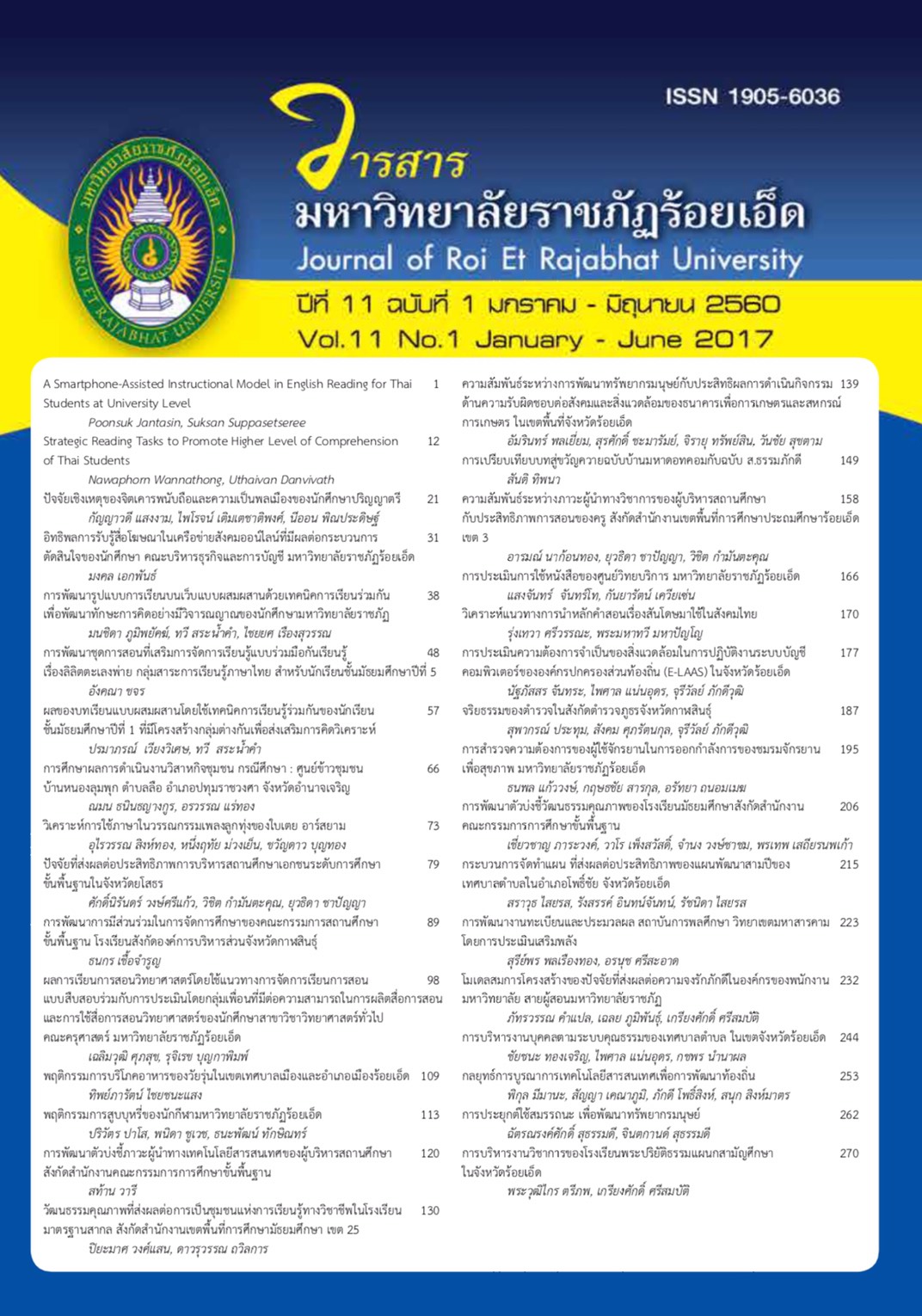The Development of Information Technology Leadership Indications of School Administrators under The Basic Education Commission
Keywords:
Leadership, Information Technology, Educational ManagerAbstract
The purposes of this study were to develop the indicators and to test the theoretical model of the Information technology leadership indicators with the empirical data of school administrators under the Basic Education Commission. Four phases of study were : Phase1–formulating a conceptual framework through synthesis of documents, research, and interviews with 9 experts; Phase 2–developing indicators using Modified Delphi Technique with 19 experts; Phase 3 –
confirmatory test of Information technology leadership indicators of 520 school administrators under the Basic Education Commission against the empirical data. The findings were as follows: 1) information technology leadership indicators of school administrators under the Basic Education Commission consisted of 5 primary factors, 17 secondary factors, and 104 indicators. 2) Confirmatory factors analysis model of information technology leadership indicators of school administrators under the Basic Education Commission had goodness-of fit with the empirical data (chi-square = 83.12, df =70, P = 0.135, GFI = 0.98, AGFI = 0.99, RMSEA = 0.019, CN = 589.91). The factor loadings ranking from the highest to the lowest were : operational performance of information technology (0.99), the use of information technology in school administration (0.96), the ethical and legal practice in the use of information technology (0.93), the vision of information technology (0.93), and information technology usage to support teaching and learning (0.89).
References
(2552-2561). วารสารศึกษาศาสตร์มหาวิทยาลัยสงขลานครินทร์วิทยาเขตปัตตานี. 21(2) ก.ค.- ธ.ค.,72.
ไพฑูรย์ ศรีฟ้า. (2556). การจัดการศึกษาที่เหมาะสมในยุคศตวรรษที่ 21. วารสารเทคโนโลยีสื่อสารการศึกษา.
มหาวิทยาลัยประสานมิตร. กรุงเทพฯ : 20 (1 ) ประจาปีการศึกษา 2556, 52.
Anderson, R. E., & Dexter, S. L. (2005). School technology leadership : An empirical investigation of
prevalence and effect. Educational Administration Quarterly, 41(1),
Akbaba-Altun, S. (2008). Technology leadership in schools. D. Deryakulu (Eds.). Information technologies
In teaching socio-in psychological variables (151-173). Ankara: Maya Academy
Publications.
Byrom, E., & Bingham, M. (2001). Factors influencing the effective use of technology for teaching and
learning: Lessons learnt from the SEIR/TEC intensive site schools (2Nd Ed.). Greensboro,
NC:University of North Carolina.
Campbell, T. (2003). Plenty of secondary school administrator leadership competencies. Te Turkish
Online Journal of Educational Technology, 2 (3), 94-107.
Chang, I. (2013). Assessing the dimensions of principals' effective technology leadership:
An application of structural equation modelling. Educational Policy Forum, 6(1), 111-141.
Fullan, M. (2002). The change leader. Educational Leadership, 59(8), 16-20.
Downloads
Published
How to Cite
Issue
Section
License
บทความที่ได้รับการตีพิมพ์เป็นลิขสิทธิ์ของวารสารมหาวิทยาลัยราชภัฎร้อยเอ็ด
ข้อความที่ปรากฏในบทความแต่ละเรื่องในวารสารวิชาการเล่มนี้เป็นความคิดเห็นส่วนตัวของผู้เขียนแต่ละท่านไม่เกี่ยวข้องกับมหาวิทยาลัยราชภัฎร้อยเอ็ด และคณาจารย์ท่านอื่นๆในมหาวิทยาลัยฯ แต่อย่างใด ความรับผิดชอบองค์ประกอบทั้งหมดของบทความแต่ละเรื่องเป็นของผู้เขียนแต่ละท่าน หากมีความผิดพลาดใดๆ ผู้เขียนแต่ละท่านจะรับผิดชอบบทความของตนเองแต่ผู้เดียว



